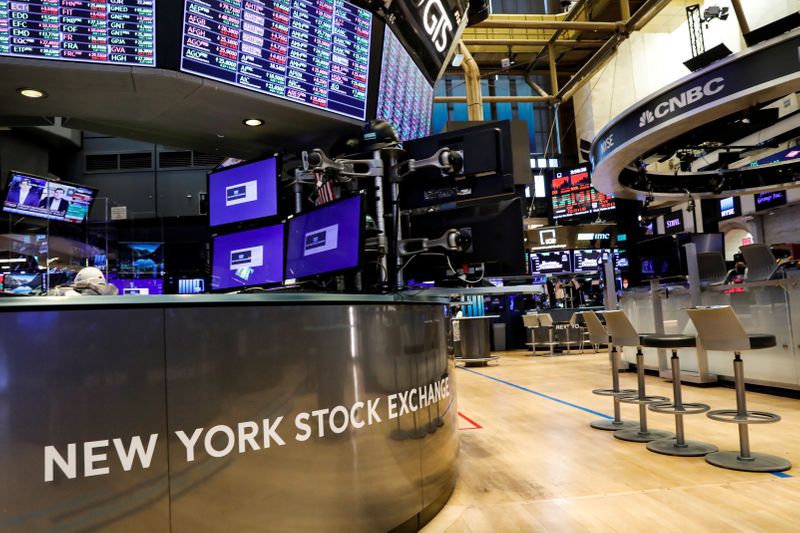By Sinéad Carew
(Reuters) - Wall Street's main indexes closed higher on Monday as investors bet on some of the market's most high-profile stocks ahead of earnings reports while they weighed progress in U.S. government stimulus efforts against rising U.S. COVID-19 cases.
Apple Inc (O:AAPL), Amazon.com Inc (O:AMZN), Facebook Inc (O:FB) and Alphabet Inc (O:GOOGL), all due to report earnings this week, were among the top boosters of the S&P 500. The technology-heavy Nasdaq posted a 1.7% gain, outperforming the S&P and the Dow.
Netflix (O:NFLX) and Microsoft (O:MSFT) also gained, noted John Augustine, chief investment officer at Huntington National Bank in Columbus, Ohio, who said investors were buying stocks in the group, which fell in recent sessions.
"When all six of them are higher they'll take markets with them," said Augustine, adding that with the exception of Facebook the so-called FAANG plus M stocks due to report have "a low bar to step over to beat earnings estimates."
The Dow Jones Industrial Average (DJI) rose 114.88 points, or 0.43%, to 26,584.77, the S&P 500 (SPX) gained 23.78 points, or 0.74%, to 3,239.41 and the Nasdaq Composite (IXIC) added 173.09 points, or 1.67%, to 10,536.27.
The biggest gainers among the S&P's 11 major sectors were technology (SPLRCT), up 1.6%, and materials (SPLRCM), up 1.4%, followed by real estate <.SPLRCR>, up 1.1%. Financials (SPSY), down 1.3%, and utilities (SPLRCU), down 0.8%, were the only sectors to end the day lower while energy (SPNY) eked out a small gain of 0.2%.
U.S. Senate Republicans raced to complete details of a $1 trillion coronavirus aid proposal before enhanced unemployment benefits expire on Friday. The aid proposal, which could involve a reduction in emergency federal weekly unemployment benefits from $600 to $200, would then need to be negotiated with Democrats.
After the market closed, senate majority leader Mitch McConnell said the package would address health, schools and include direct payments to Americans of $1,200 each.
Some investors have worried whether the package would provide sufficient support for the economy. These concerns were reflected in gains in assets viewed as safe havens such as the big growth companies and gold
"Today's story is about concerns that the economic recovery will be slow and halting. That's from a combination of an inability to bend the virus curve and what is shaping up to be a small stimulus package that may not address all the needs being created by this terrible crisis," said Hooper.
Trillions of dollars in fiscal and monetary stimulus have been pivotal pushing the S&P 500 closer to its February record high. It ended Monday's session 4.3% below the record.
On Monday, as the world confronted the prospect of rising COVID-19 infections, countries in Asia and Europe imposed new restrictions.
In the United States, where infection rates have climbed since June, two baseball games were canceled due to the virus while President Donald Trump's national security adviser Robert O'Brien was the most senior official to test positive.
Investors kept their eye on earnings, with 189 S&P 500 companies scheduled to report results this week. About 80% of the 130 S&P 500 firms that have reported so far have beaten a low bar of earnings estimates, according to IBES Refinitiv data.
Few expected any major announcement at a two-day Federal Reserve meeting, but analysts said policymakers were likely to lay the groundwork for more action later this year.
Moderna Inc (O:MRNA) shares finished up 9% after U.S. and company officials said its COVID-19 vaccine may be ready for widespread use by year-end. The drugmaker announced it started a trial to demonstrate safety and effectiveness, which could be the final hurdle prior to regulatory approval.
Advancing issues outnumbered declining ones on the NYSE by a 1.66-to-1 ratio; on Nasdaq, a 1.47-to-1 ratio favored advancers.
The S&P 500 posted 19 new 52-week highs and no new lows; the Nasdaq Composite recorded 64 new highs and 27 new lows.

On U.S. exchanges 9.69 billion shares changed hands compared with the 10.6 billion average for the last 20 sessions.